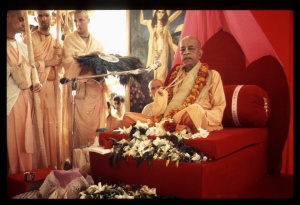CC Madhya 8.291 (1975): Difference between revisions
(Vanibot #0027: CCMirror - Mirror CC's 1996 edition to form a basis for 1975) |
(Vanibot #0020: VersionCompareLinker - added a link to the Version Compare feature) |
||
| Line 2: | Line 2: | ||
<div style="float:left">'''[[Sri Caitanya-caritamrta (1975)|Śrī Caitanya-caritāmṛta (1975)]] - [[CC Madhya (1975)|Madhya-līlā]] - [[CC Madhya 8 (1975)|Chapter 8: Talks Between Śrī Caitanya Mahāprabhu and Rāmānanda Rāya]]'''</div> | <div style="float:left">'''[[Sri Caitanya-caritamrta (1975)|Śrī Caitanya-caritāmṛta (1975)]] - [[CC Madhya (1975)|Madhya-līlā]] - [[CC Madhya 8 (1975)|Chapter 8: Talks Between Śrī Caitanya Mahāprabhu and Rāmānanda Rāya]]'''</div> | ||
<div style="float:right">[[File:Go-previous.png|link=CC Madhya 8.290 (1975)|Madhya-līlā 8.290]] '''[[CC Madhya 8.290 (1975)|Madhya-līlā 8.290]] - [[CC Madhya 8.292 (1975)|Madhya-līlā 8.292]]''' [[File:Go-next.png|link=CC Madhya 8.292 (1975)|Madhya-līlā 8.292]]</div> | <div style="float:right">[[File:Go-previous.png|link=CC Madhya 8.290 (1975)|Madhya-līlā 8.290]] '''[[CC Madhya 8.290 (1975)|Madhya-līlā 8.290]] - [[CC Madhya 8.292 (1975)|Madhya-līlā 8.292]]''' [[File:Go-next.png|link=CC Madhya 8.292 (1975)|Madhya-līlā 8.292]]</div> | ||
{{CompareVersions|CC|Madhya 8.291|CC 1975|CC 1996}} | |||
{{RandomImage}} | {{RandomImage}} | ||
==== TEXT 291 ==== | ==== TEXT 291 ==== | ||
<div class="verse"> | <div class="verse"> | ||
: | :āmi--eka bātula, tumi--dvitīya bātula | ||
:ataeva tomāya āmāya ha-i sama-tula | :ataeva tomāya āmāya ha-i sama-tula | ||
</div> | </div> | ||
| Line 25: | Line 24: | ||
<div class="translation"> | <div class="translation"> | ||
Caitanya Mahāprabhu then said, | Caitanya Mahāprabhu then said, "Indeed, I am a madman, and you are also a madman. Therefore both of us are on the same platform." | ||
</div> | </div> | ||
| Line 32: | Line 31: | ||
<div class="purport"> | <div class="purport"> | ||
All these conversations between Rāmānanda Rāya and Śrī Caitanya Mahāprabhu appear ludicrous to a common man who is not a devotee. The entire world is filled with material conceptions, and people are unable to understand these conversations due to the conditioning of mundane philosophy. Those who are overly attached to mundane activities cannot understand the ecstatic conversations between Rāmānanda Rāya and Caitanya Mahāprabhu. Consequently the Lord requested that Rāmānanda Rāya keep all these conversations secret and not expose them to the general populace. If one is actually advanced in Kṛṣṇa consciousness, he can understand these confidential talks; otherwise they appear crazy. Śrī Caitanya Mahāprabhu therefore informed Rāmānanda Rāya that they both appeared like madmen and were therefore on the same platform. It is confirmed in the Bhagavad-gītā ([[BG 2.69 (1972)| | All these conversations between Rāmānanda Rāya and Śrī Caitanya Mahāprabhu appear ludicrous to a common man who is not a devotee. The entire world is filled with material conceptions, and people are unable to understand these conversations due to the conditioning of mundane philosophy. Those who are overly attached to mundane activities cannot understand the ecstatic conversations between Rāmānanda Rāya and Caitanya Mahāprabhu. Consequently the Lord requested that Rāmānanda Rāya keep all these conversations secret and not expose them to the general populace. If one is actually advanced in Kṛṣṇa consciousness, he can understand these confidential talks; otherwise they appear crazy. Śrī Caitanya Mahāprabhu therefore informed Rāmānanda Rāya that they both appeared like madmen and were therefore on the same platform. It is confirmed in the Bhagavad-gītā ([[BG 2.69 (1972)|2.69]]): | ||
:yā niśā sarva-bhūtānāṁ | |||
:tasyāṁ jāgarti saṁyamī | |||
:yasyāṁ jāgrati bhūtāni | |||
:sā niśā paśyato muneḥ | |||
"What is night for all beings is the time of awakening for the self-controlled; and the time of awakening for all beings is night for the introspective sage." | |||
Sometimes Kṛṣṇa consciousness appears like a type of madness to mundane people, just as the activities of mundaners are considered a form of madness by Kṛṣṇa conscious men. | Sometimes Kṛṣṇa consciousness appears like a type of madness to mundane people, just as the activities of mundaners are considered a form of madness by Kṛṣṇa conscious men. | ||
</div> | </div> | ||
Latest revision as of 20:13, 27 January 2020

A.C. Bhaktivedanta Swami Prabhupada
TEXT 291
- āmi--eka bātula, tumi--dvitīya bātula
- ataeva tomāya āmāya ha-i sama-tula
SYNONYMS
āmi—I; eka—one; bātula—madman; tumi—you; dvitīya—second; bātula—madman; ataeva—therefore; tomāya—you; āmāya—Me; ha-i—are; sama-tula—on an equal level.
TRANSLATION
Caitanya Mahāprabhu then said, "Indeed, I am a madman, and you are also a madman. Therefore both of us are on the same platform."
PURPORT
All these conversations between Rāmānanda Rāya and Śrī Caitanya Mahāprabhu appear ludicrous to a common man who is not a devotee. The entire world is filled with material conceptions, and people are unable to understand these conversations due to the conditioning of mundane philosophy. Those who are overly attached to mundane activities cannot understand the ecstatic conversations between Rāmānanda Rāya and Caitanya Mahāprabhu. Consequently the Lord requested that Rāmānanda Rāya keep all these conversations secret and not expose them to the general populace. If one is actually advanced in Kṛṣṇa consciousness, he can understand these confidential talks; otherwise they appear crazy. Śrī Caitanya Mahāprabhu therefore informed Rāmānanda Rāya that they both appeared like madmen and were therefore on the same platform. It is confirmed in the Bhagavad-gītā (2.69):
- yā niśā sarva-bhūtānāṁ
- tasyāṁ jāgarti saṁyamī
- yasyāṁ jāgrati bhūtāni
- sā niśā paśyato muneḥ
"What is night for all beings is the time of awakening for the self-controlled; and the time of awakening for all beings is night for the introspective sage."
Sometimes Kṛṣṇa consciousness appears like a type of madness to mundane people, just as the activities of mundaners are considered a form of madness by Kṛṣṇa conscious men.